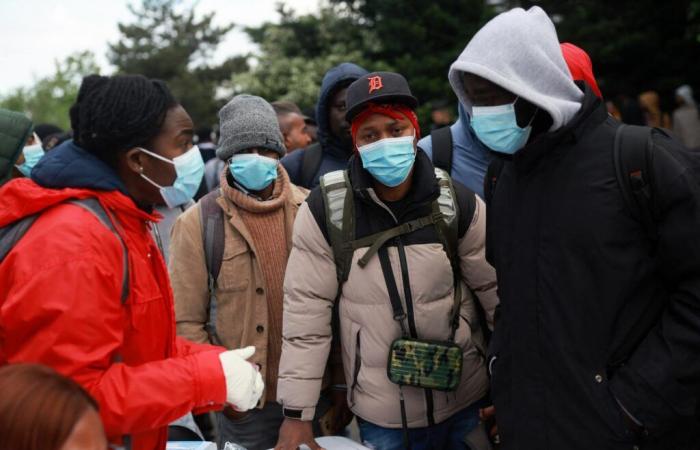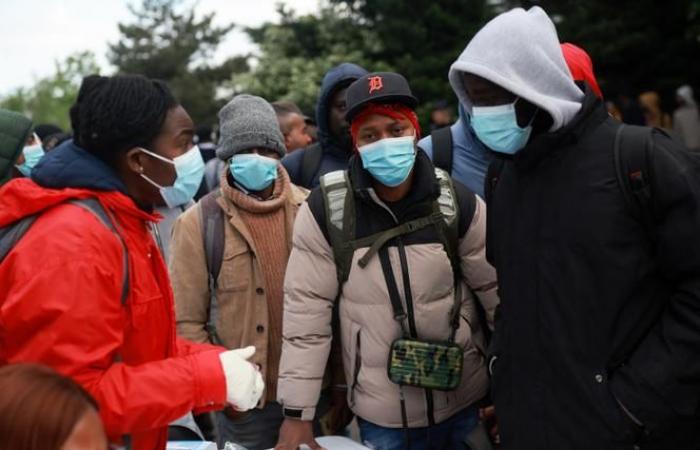When she receives us in her small premises in Cocody, a district of Abidjan, Myriam Quanteny, 29 years old, wearing emerald green suit pants and a well-ironed white shirt, is not lacking in activity. In France, she was employed in the human resources department of a large company. Since her return to Ivory Coast in September 2023, she has reconverted into an entrepreneur in the catering sector.
Myriam Quanteny is one of the 230 “voluntary return migrants” in Côte d'Ivoire, according to the language used by the French Office for Immigration and Integration (OFII). If they are only a few dozen to have chosen to be accompanied on their return home, due to lack of a valid residence permit in France, their journey is highlighted by Paris, which cherishes the hope that he will become a model.
Myriam Quanteny requested a voluntary return even before receiving an obligation to leave French territory (OQTF). However, the planets of her move to France seemed aligned: after a master's degree in labor law and human resources carried out between the faculty of Nanterre and the Institute of Advanced Economic and Commercial Studies, the company where she worked on a fixed-term contract as responsible for recruitment had offered to upgrade his contract to a permanent contract. But his student visa expired in the meantime. The young woman then lost her job and her housing at the same time as her residence permit.
Also read the report | Article reserved for our subscribers In a center for the voluntary return of foreigners: “We have decided to return to the country”
Read later
After a year of precariousness, in January 2023 she discovered the system of “helped return” of the OFII by an Internet search. She went to the Office's premises, then received a summons to police headquarters a few weeks later. Her return by plane was arranged and the young woman found herself in Abidjan, with a nest egg of 650 euros in her pocket and a project “professional integration” to mount.
“All stages of an entrepreneurial project”
The OFII finances return projects, including support provided by subcontractors and consulting firms, up to a maximum of 10,000 euros per person. « We go through all the stages of an entrepreneurial projectshe explains: feasibility study, business plan, market study… And when the project is mature, we are interviewed by an OFII committee which decides whether or not to grant funding and access to additional training. »
Of the fifteen people in Myriam Quanteny's class, two thirds saw their project validated by the OFII, including her catering company, L'Africaine. The others did not appear before the committee or were not convincing.
For everyone, the challenge is to bounce back quickly, while the return, even ” voluntary “is often seen as a failure. « Especially when you come back with almost nothingunderlines Togny Elysée, another beneficiary. Because the procedures at the prefecture are very long and we often spent all our savings before making the decision to return. »
Read also | Ivory Coast denies being one of the main providers of migrants in Europe
Read later
He too is a “good student” of the OFII. Failing to find a position immediately after his thesis defense in literature and communication at the University of Limoges in 2019, Togny Elysée was unable to transform his student visa into a work visa. After receiving an OQTF, he agreed to return to Ivory Coast in 2022, suspending his ambitions in research or teaching to open a cleaning company, Nikel Services. He estimates the sum invested by OFII, which has since become one of his clients, at 7,000 euros. His small business is already flourishing and, since its launch in April, has exceeded 5 million CFA francs (7,660 euros) in turnover.
“A good device”
Both judge that it is « a good system that France has put in place ». “It is beneficial to us, but it is also beneficial to France »noted Myriam Quanteny, letting out a little laugh.
Stay informed
Follow us on WhatsApp
Receive the essential African news on WhatsApp with the “Monde Afrique” channel
Join
OFII officials readily acknowledge this. « The objective for France is to reduce irregular immigration and increase voluntary returns. Even if voluntary return does not exclude forced return »underlines Didier Leschi, its general director, after the inauguration with great fanfare, on November 21, of the premises in Abidjan, whose offices are still provisional. « Their interest is to accept voluntary return. It is still more worthy to come back with an entrepreneurial project than with empty pockets, between two police officers »he boasts, describing the OFII as“microdevelopment organism”.
Read also | OQTF: understanding the debate on measures to remove undocumented foreigners in France
Read later
Didier Leschi recognizes, however, that the figures are still modest. Since the launch of its activity in July 2023, the OFII in Abidjan has enabled the creation of 113 businesses, 12 agricultural operations, 42 livestock farms, 51 service companies, for a total of 1.21 million euros in direct aid at the start of the business.
Of the “lace”admits the general director, but of which the OFII hopes to make an example to dissuade candidates for exile from Côte d'Ivoire and, above all, for immigrants without a residence permit in France. According to the latest report from the French Office for the Protection of Refugees and Stateless Persons, Côte d'Ivoire was the sixth country of origin for asylum seekers in France in 2023, with 7,130 people in France.
Cheaper than forced return
But the return helped costs France significantly less than forced return, explained in 2019 a parliamentary report by former MPs Jean-Noël Barrot (Yvelines, MoDem), the current French Minister of Foreign Affairs, and Alexandre Holroyd (French people established outside France , Renaissance). This resulted in an average cost of 13,800 euros per forced removal, compared to 2,500 to 4,000 euros on average per assisted return.
Also read the survey | Article reserved for our subscribers “I’ve gone crazy, I want to go back to the country”: migrants who opt for voluntary return
Read later
In its January 2024 report, the Court of Auditors estimated the cost of the policy to combat irregular immigration at 1.8 billion euros per year, while France is the country which carries out the most forced returns of the European Union. « The cost of one day of detention amounts to 602 euros, underlines the report of the Court of Auditors. (…) The fight against irregular immigration mobilizes around 16,000 full-time civil servants and soldiers, three-quarters of whom are border police agents. »
According to the institution, between 2019 and 2022, 16,000 Ivorians were targeted by an OQTF and 500 were actually expelled.
Read also | Understand what voluntary return assistance paid to foreigners is
Read later







